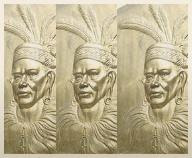
 by Sim Kwang Yang
by Sim Kwang Yang
Should Abdul Taib Mahmud - the chief minister of Sarawak - step down, after 27 years at the helm of near absolute power in the resource rich state?Does PBB - his party that holds half the number of seats in the Sarawak State Assembly - bully the other component parties of the Sarawak Barisan Nasional? The answer to both questions is a resounding yes!
But this kind of questions is only relevant to members and supporters of the Sarawak BN. Other Sarawakians know very well that Taib will not step down on his own accord.
He has to cling on to the throne in Sarawak, to protect the future of his gargantuan family
conglomerate CMS (an acronym that could designate the company Cahaya Mata Sarawak or the title Chief Minister of Sarawak - an interesting coincidence).
Whenever conversations meander off onto the topic of the Sarawak CM in private circles, it is hard for people not to mention CMS in the same breath. Its dominant presence in the Sarawak’s economy - especially in the public sector in the state - is well known.
Actually, the acronym for CMS has its origins in a precursor to the Sarawak Economic Development Corporation (SEDC): Cement Manufacturers Sarawak.
The report in The EdgeThe repressed press of Malaysian media have seldom told the story of CMS. On the other hand, there have been a few reports by international media on Taib’s family business. The following report by Michael Backman, entitled ‘In Sarawak, politics and cash are all in the family’, was published in The Edge on March 15 2001 in Melbourne, Australia:
CMS Group was originally a joint venture between the state government’s Sarawak Economic Development Corporation (SEDC) and the neighbouring state of Sabah.
The group started as a monopoly cement producer to feed the building boom in both states. In 1989, the Sabah government sold its stake and the Sarawak government decided the company should be listed on the Kuala Lumpur Stock Exchange. At the same time, the chief minister’s brother, Onn bin Mahmud, and his two sons, Mahmud Abu Bekir Taib and Sulaiman Abdul Rahman Taib, were brought in.
The Taib family owns about half the company and the SEDC’s equity has been diluted to about eight percent. Effectively, the chief minister had decided to privatise CMS - and it was his family that bought it.
CMS has since expanded to more than 40 subsidiaries that operate in infrastructure development, water supply, steel making, transport, manufacturing, property development, financial services and stock broking.
But CMS is not the Taib family’s only business concern. Timber is the main source of Sarawak’s wealth. Logging concessions, which the Sarawak government hands out, are are a license to print money. The chief minister’s family happens to possess significant logging concessions.
Indeed, claims have been published that companies associated with Taib and his supporters hold about 1.6 million hectares in timber concessions with a combined logged value of up to US$12 billion.
Taib’s time in politics has coincided with the apparent accumulation of enormous family wealth. He is known for his expensive tastes - he is rumoured to have paid almost US$2 million for the grand piano that belonged to late American showman Liberace.”
There it is. The above report, published in 2001, is still relevant today. The question of whether Taib’s discharge of his official duty as CM amidst the meteoric rise of CMS constitutes a conflict of interest or outright corruption is a purely academic one.
As long as he can deliver all or nearly all 31 parliamentary seats in Sarawak to keep the Umno prime minister in power, as has been proven during the March 8 general election, the PM and all the federal agencies under his jurisdiction will not touch the Sarawak CM with a ten-foot pole.
A dynasty in the making?If you check into the traffic on Sarawak Internet, you will find the name of the CM, together with the name of Deputy Chief Minister Alfred Jabu, the most vilified and defiled names in the state. A referendum among Sarawak netizens will conclude that indeed the CM has overstayed his welcome.
But the CM will not go gently into the good night in more ways than one. His brother joined the Sarawak State Assembly as a member in the last state election in 2006.
In the May parliamentary election, his son Sulaiman was elected as MP, and was promptly co-opted into the federal government as a deputy minister, presumably to learn about the art of government. Do we see a dynasty in the making? Only time will tell.
Therefore, for Taib’s detractors to fulfill their dream of changing the Chief Minister of Sarawak, there is only one way, and that is through the next state general election speculated to be held as early as next year.
Slightly more than a week ago, during a dinner in Sibu organised by
“Friends of PKR”, 4000 people of all races turned up to welcome Anwar Ibrahim and witness a public ceremony in which Gabriel Adit, the current independent state assemblyperson representing Ngemah and a former vice-president of the now defunct Parti Bansa Dayak Sarawak (PBDS) submit his application to join PKR, together with 12,000 others.
The choice of Sibu as the dinner venue is significant. Sibu is sited on the bank of the mighty Rejang River, and upstream, the Rejang basin is one of the most notable Iban heartlands in Sarawak. Adit’s dramatic personal political make-over is symbolic for many disgruntled Dayaks in Sarawak. Some Dayaks have already predicted a new dawn for Sarawak, a revival of Dayak power on the political scene in the state.
Nothing is impossible in politics I suppose, having just witnessed the historic conclusion of the American presidential election. But Sarawak is no America, and Sarawakians are a far cry from Americans in many political aspects.
The opposition parties in Sarawak are now fragmented and weakened, divided by race, region, and personal feuds among their leaders. The hounds also run with the hares. The Sarawak political arena is quite a muddied pond full of all kinds of reptiles, swimming along with the real dragons.
Eventually, the Achilles’ Heel of the opposition parties in Sarawak is their lack of funds, in sharp contrast to the seemingly inexhaustible source of funds lying in the Barisan Nasional war chest.
Unlike politics in the peninsula states, Sarawak politics, especially in the rural constituencies, is still mired in money politics. That is why the cash-rich Sarawak BN has been so successful in so many past parliamentary and state elections.
I have met many rural voters who actually would demand cash for their votes. Ugly as it may seem, it has become one of the less savoury features of Sarawak democracy.
To break this distasteful tradition, the opposition must not buy votes, or give all kinds of largesse during general elections, including building materials, personal gifts in kind, or standing feasts that can last throughout the duration of the campaign period. (Yes, this is how things are done in Sarawak.)
They must device more meaningful and innovative methods of campaigning, the likes of which Sarawak rural voters have never seen before.
Anwar’s full attentionBut then there is still the huddle of reaching the rural voters. There is still the question of funding, needed for large groups of canvassers and campaigners to travel long distances across difficult terrain to motivate and organise local grassroots leaders in every village and every longhouse throughout this vast and sparsely populated state where modern infrastructure for communication and transport is primitive at best.
We are talking about hundreds and thousands of ringgit for one rural constituency alone. Multiply that by the 50 or so rural and semi-rural constituencies and you get the rough estimate of how much money it takes to change the CM of Sarawak.
This is only one hurdle. I can write a book on the problems and experiences of contesting in Sarawak alone.
But the great dinner in Sibu is a good start towards solving those problems. Obviously Anwar was suitably impressed; he said that if the response from Sarawakians is so good, he should perhaps visit Sarawak more often.
I believe PKR is a suitable vehicle for positive change in Sarawak for various reasons, not least of which is the clout of the party in national politics and in the Pakatan Rakyat coalition.
For that change to happen, Anwar may have to turn his full attention to this vast eastern state of Sarawak - now.
He has to go there often, to heal wounds among the opposition camp, to build consensus and coalition, to work out a statewide strategy, coin mission statements, supervise organisation, to recruit new talents who will be free from negative political baggage, and above all, squeeze out the funds from whatever resources at his disposal for the big campaign. He has to do it, like yesterday.
The prize is worth his trouble. In Sarawak, state power determines the outcome of the parliamentary elections most of the time. A change of the chief minister will greatly improve Anwar’s chance of becoming the prime minister of Malaysia in the next parliamentary general election.
For justice in the Land of the Hornbill in the emergence of a new Malaysia!































 On Saturday, the party’s Baleh division publicity head Beginda Minda had revealed two instances of alleged
On Saturday, the party’s Baleh division publicity head Beginda Minda had revealed two instances of alleged  Since this is subject to final approval by PBB leaders, it makes a mockery of the original concept of the BN power-sharing concept in Sarawak, he said.
Since this is subject to final approval by PBB leaders, it makes a mockery of the original concept of the BN power-sharing concept in Sarawak, he said.
 Despite these internal BN problems, Sarawak managed to deliver all but one of its 31 parliamentary seats to the BN. The ruling coalition only lost Bandar Kuching to DAP.
Despite these internal BN problems, Sarawak managed to deliver all but one of its 31 parliamentary seats to the BN. The ruling coalition only lost Bandar Kuching to DAP.














